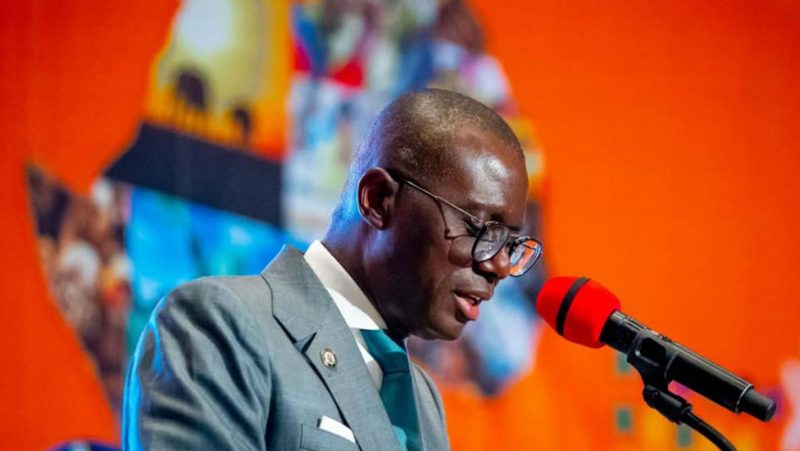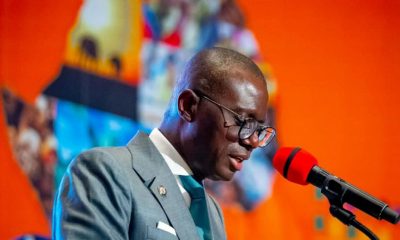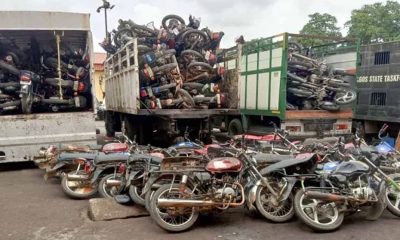Lagos govt incurs ₦114.5b from 6,047 court cases
metro
Lagos govt incurs ₦114.5b from 6,047 court cases

Sanwo-Olu made the call just as the state attorney-general disclosed that there were 6,047 pending cases involving the state government across various categories.
Sanwo-Olu spoke at the opening of a two-day strategic management meeting with Ministries Departments and Agencies (MDAs), and other stakeholders, in Ikeja.
The News Agency of Nigeria (NAN) reports that the meeting was organised by the Lagos State Ministry of Justice.
The governor was represented by his Deputy, Dr Obafemi Hamzat.
He emphasised the need for swift justice so as to strengthen the rule of law.
Sanwo-Olu, citing the case of a 22-year-old fashion designer, Miss Oluwabamise Ayanwole, allegedly raped and murdered by Andrew Omininikoron, a Lagos Bus Rapid Transit driver, in March 2022, decried that justice had yet to be served in the case.
He, therefore, appealed for efficiency in judicial processes in order to foster public confidence in the judicial system.
Sanwo-Olu added that the judiciary should ensure fairness, impartiality and accountability.
According to him, there are cases in courts in which urgent decisions are required.
“There is a need for greater transparency, and cooperation among stakeholders in the judicial system.”
READ ALSO:
The governor said that the state government was committed to building a more responsive, inclusive and efficient justice system for the overall good of the people, irrespective of race and religion.
Sanwo-Olu also emphasised the crucial role of the rule of law and science/technology in bridging the gap between African countries and developed nations.
He said that technology and science were transforming people’s lives, adding that the rule of law must adapt to changes.
The governor identified ineffective land management and physical planning laws as significant challenges facing the country.
He stressed the need for lawyers and judges to be well-versed in land laws to ensure proper planning for future generations.
Earlier in his opening remarks, Lawal Pedro (SAN), the State Attorney-General and Commissioner for Justice, said that the purpose of the meeting was to reduce government litigations in courts.
According to him, it will help to prevent clogging of the justice delivery system.
Pedro emphasised the need for Lagos State MDAs to devise strategies to reduce litigation, minimise inter-ministerial gaps, and limit government exposure to avoidable liabilities.
“As of July 2024, before the courts’ annual vacation, there were over 6,047 pending cases involving the government across various categories, including land disputes (over 2,500 cases), physical planning (310), housing (240), road transportation (150).
“Other pending cases include 75 from the environment, 250 chieftaincy cases, breach of contract (50), employment and pension (50), and constitutional and FMHR cases (150).
“The financial implication for the government in these cases is estimated to be around N114.5 billion,” he said.
The attorney-general stressed the need to redesign the operating systems and processes of MDAs to enhance performance in areas such as cost, quality, service and speed.
Lagos govt incurs ₦114.5b from 6,047 court cases
metro
Suspected IPOB members kill two soldiers in Imo

Suspected IPOB members kill two soldiers in Imo
The Nigerian Army has confirmed the death of two soldiers and the theft of their weapons by operatives of the Eastern Security Network (ESN), the militant arm of the Indigenous People of Biafra (IPOB).
IPOB is a separatist group advocating for the creation of the Republic of Biafra, citing longstanding grievances over the marginalization of Nigeria’s South-East region since the Biafra-Nigeria civil war.
In a statement released on Saturday, the Nigerian Army explained that the incident occurred in Osina, Ideator North Local Government Area of Imo State, when troops from the 34 Artillery Brigade, returning from a routine patrol, responded to an emergency call about an attack on Osina Community by IPOB/ESN forces.
The statement revealed that upon arrival, the troops engaged the “terrorists” with overwhelming firepower, resulting in casualties among the attackers. However, the Army did not provide specific numbers, only noting that the “dissidents” eventually withdrew in disarray.
“Unfortunately, two security agents had been killed in action and one other missing in action, with their weapons—a AK-47 rifle and a tear gas launcher—being seized by the terrorists,” the statement said.
READ ALSO:
- 13 passengers burnt to death in Ondo auto crash
- NDDC empowers Niger Delta young entrepreneurs with N30bn
- Oshiomhole supports Edo Assembly suspension of council chairmen
The Army confirmed that the bodies of the fallen soldiers had been recovered, and the troops pursued the fleeing militants.
“Contact was again made with the criminal IPOB/ESN elements at Nkwachi Community, and in the firefight that ensued, one of the dissidents was neutralized while others, unable to withstand the troop’s firepower, retreated into the nearby forest. One AK-47 rifle with a fully loaded magazine was recovered, ” the statement said, adding that the troops continued their pursuit into Umalouma forest, where another intense exchange of fire took place.
“The dissidents eventually abandoned their weapons due to the troops’ superior firepower and scattered into the dense forest with severe gunshot wounds. An additional four AK-47 rifles, one Fabrique Nationale rifle, and two magazines were recovered,” the statement added.
The Army assured the public that operations would continue, with efforts to track down and eliminate the remaining criminals. “Further exploitation is ongoing as troops continue to track down the injured terrorists and flush them out of their hideouts and treatment locations,” the statement stated. “We urge all IPOB/ESN elements and other criminals hiding in the bushes to surrender to the nearest troops or face defeat, as the Brigade will ensure that the people of Imo celebrate the Yuletide season in peace, free from fear or intimidation.”
The Nigerian Army also called on the people of Imo State to continue providing timely intelligence to assist in the fight against criminal elements and help rid the state of lawlessness.
Suspected IPOB members kill two soldiers in Imo
metro
13 passengers burnt to death in Ondo auto crash

13 passengers burnt to death in Ondo auto crash
The Federal Road Safety Corps, Ondo State Sector Command, says no fewer than 13 people were burnt to death along Ikare-Akoko/ Owo Road on Saturday in the state.
Dr Samuel Ibitoye, FRSC State Sector Commander made this known in a statement made available to the News Agency of Nigeria on Saturday in Akure.
“FRSC regrets to inform the public about a road traffic crash that occurred today 28 December, 2024 at Abule Panu before Ose Bridge, on Owo-Ikare highway, Ondo State.
“The fatal crash which occurred at about 10:14 AM claimed 13 lives of commuters in two buses.
READ ALSO:
- NDDC empowers Niger Delta young entrepreneurs with N30bn
- Oshiomhole supports Edo Assembly suspension of council chairmen
- Police warn errant cops misusing IGP’s name, office
“A total of 14 people were involved, out of which 13 were burnt beyond recognition, while only one was rescued alive with serious injuries.
“Eyewitness account indicates that the bus coming from Ikare axis had a tyre burst which led to loss of control.
“This was resultant in a head-on collision with the bus loaded with fabric coming from Owo axis.
“Immediately after the collision, the two buses went up in flames. The men of FRSC, Police and Fire Service were swiftly at the crash scene for rescue,” he said.
The FRSC boss said that the injured victim was taken to Federal Medical Centre, Owo, while the deceased were deposited at the morgue of the same hospital.
He, therefore, advised drivers to exercise patience on the roads and passionately maintain their vehicles.
“Passengers are also encouraged to speak out against dangerous driving because road safety is a concern of all,” Ibitoye said.
13 passengers burnt to death in Ondo auto crash
NAN
metro
NDDC empowers Niger Delta young entrepreneurs with N30bn

NDDC empowers Niger Delta young entrepreneurs with N30bn
The Niger Delta Development Commission (NDDC) has pledged to galvanise the Niger Delta Chambers of Commerce, Industry, Trade, Mines and Agriculture (NDCCITMA) by releasing N30 billion counterpart fund for the development of young entrepreneurs.
The NDDC Managing Director, Dr Samuel Ogbuku who disclosed this in Port Harcourt, restated the Commission’s commitment to empowering the people of the region through economic programmes.
He highlighted the NDCCITMA’s role in training youths, supporting SMEs, and designing industry-friendly skill development programmes.
He said, “We are providing N30 billion to fund projects and support businesses to ensure the sustainability of our youth development initiatives.
READ ALSO:
- Oshiomhole supports Edo Assembly suspension of council chairmen
- Police warn errant cops misusing IGP’s name, office
- Israel ejects Gaza hospital, detains medical personnel
“We will release the matching funds so the entrepreneurs can access them to boost their businesses. In our 2024 budget, we have provision for N30 billion which we are to use as matching funds for the chamber of commerce. We are working towards releasing this fund so that the chamber of commerce can start work in earnest.
“The Niger Delta Chamber of Commerce will strengthen young entrepreneurs in the region. It is no longer acceptable for our youths to be contented with receiving stipends while at home doing nothing.
Ogbuku remarked that the Commission was collaborating with the Bank of Industry, BOI, to ensure the success of NDDC’s youth development programmes.
“The current NDDC Board and Management choose to look at sustainable options in designing youth programmes. In the past, we did a lot in supporting entrepreneurs in the Niger Delta but these activities were not properly documented and backed with verifiable data.
“Our new strategy is to support genuine entrepreneurs rather than people who are just portfolio entrepreneurs because we know that the government alone cannot employ everybody. Many university graduates are coming out, and the government cannot employ all of them. However, we can empower them by creating an environment where they can engage other persons to expand their businesses.”
NDDC empowers Niger Delta young entrepreneurs with N30bn
-

 Business2 days ago
Business2 days agoBe creative, monarch, others challenge Muslim professionals on economic revival
-

 Auto1 day ago
Auto1 day agoLSM MD extols founder’s qualities after latter posthumous industry award
-

 Entertainment1 day ago
Entertainment1 day agoMultiChoice announces free access to all DSTV channels for 3 days
-

 metro2 days ago
metro2 days agoJigawa State governor loses son 24 hours after mother’s death
-

 metro1 day ago
metro1 day agoHeavy security in Ilesa as ex-Osun deputy gov emerges new Owa-Obokun
-

 News23 hours ago
News23 hours agoNigeria Customs Service begins 2025 recruitment [How to apply]
-

 metro22 hours ago
metro22 hours agoLagos Imam to Tinubu: You haven’t disappointed us
-

 metro1 day ago
metro1 day agoDangote, Tinubu, Lookman named among 100 most influential Africans in 2024 (Full list)







